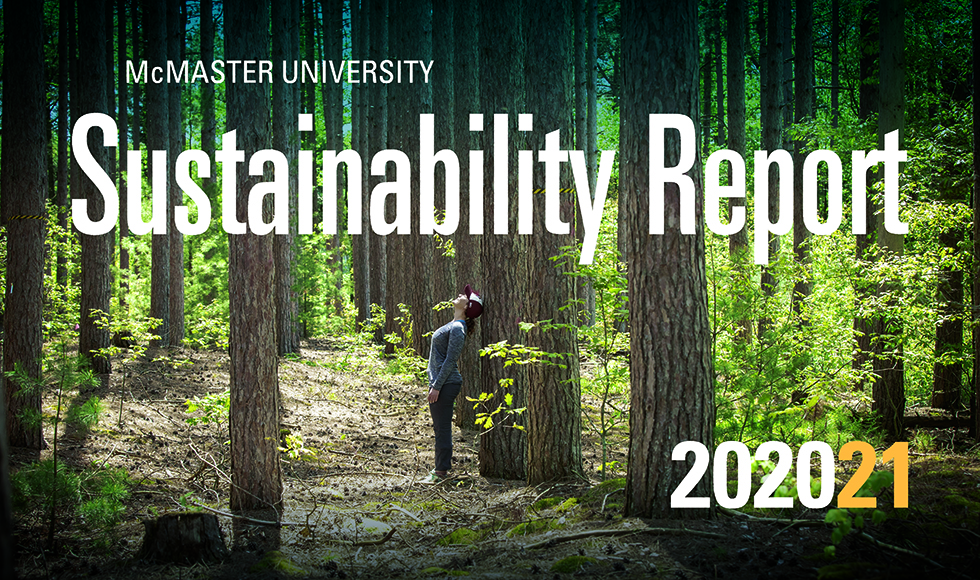New report offers snapshot of campus-wide sustainability action

Sustainability, in all its forms, matters to the McMaster community.
The focus on environmental sustainability runs through every part of the university, from innovative teaching and research, to the campus environment and operations. A snapshot of these collective measures to advance environmental sustainability within our institution, the communities that surround us and around the world can now be viewed together as McMaster’s inaugural university-wide Sustainability Report.
“Addressing the most pressing challenges facing our communities and our planet, including climate change and environmental sustainability, is a goal that matters deeply to the McMaster community,” says president David Farrar. “As a university, it is incumbent on us to lead by example. This report will help us engage our community in transforming our campus into a living laboratory for sustainability, focusing on carbon reduction, energy and waste management, with the ultimate goal of being a carbon free campus.”
Although the report does not capture all of McMaster’s numerous environmentally sustainability focused activities, it provides a glimpse into much of the work being done. The report draws on examples from across all faculties, multiple departments and units, to demonstrate McMaster’s environmentally sustainable actions, with a focus on three key pillars.
The first pillar articulates McMaster’s commitment to the protection and conservation of natural resources, as well as our efforts to contribute to a sustainable food system. Did you know McMaster has around 5000 trees on our 300-acre campus?
The second pillar illustrates our commitment to reducing our environmental footprint by building and operating our campus sustainably, including water, energy, greenhouse gas emissions and waste reduction initiatives. For example, McMaster has 200 water filling stations on campus diverting 20 million plastic bottles from landfill.
The third pillar explores McMaster’s efforts to integrate sustainability into our students’ academic experiences through innovative interdisciplinary programs and experiential learning. As Canada’s most research-intensive university, this pillar also details some of the many research activities with an environmental emphasis, such as The Co-Creation of Indigenous Water Quality Tools research project led by Dawn Martin Hill, Associate Professor, Department of Anthropology and Indigenous Studies Program.
While sustainability is a comprehensive term encompassing social, environmental, political and economic factors, this inaugural Sustainability Report focuses on the actions that protect the planet. Numerous other reports developed by McMaster that focus on sustainability more broadly are linked to this report.
McMaster University is ranked 14th globally for impact and 1st in Canada for Good Health and Well-being by the Times Higher Education Impact Rankings, which recognize the contributions of universities as they work to make the world a safer, more sustainable place based on the United Nations’ Sustainable Development Goals (SDGs). Within the inaugural university-wide Sustainability Report, we provide a map of how our university’s environmental actions link to the SDGs.
“In the coming year there is a lot of work to do to continue to promote sustainability at McMaster. The Office of Sustainability will spend the next several months developing a Sustainability Plan for our campus. To create the plan, we will be seeking perspectives and inputs from students, faculty members and staff across McMaster. In future, this report will feature progress on this plan and continue to highlight the amazing activities occurring on campus in the area of sustainability,” says Debbie Martin, co-chair of McMaster’s Sustainability Advisory Council, assistant vice-president and chief facilities officer.
The 2020/21 Sustainability Report is available on McMaster’s website.


